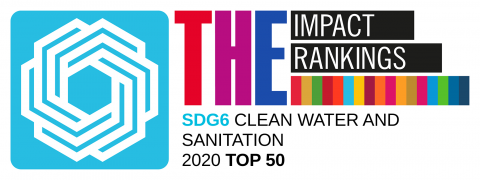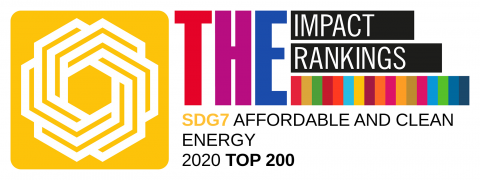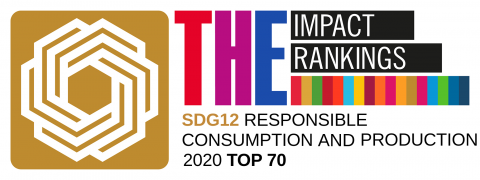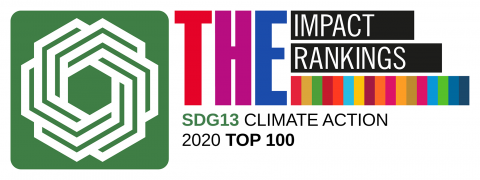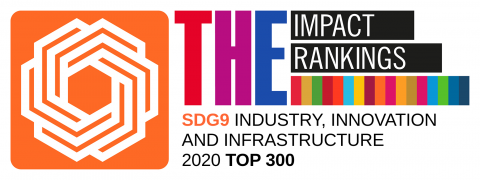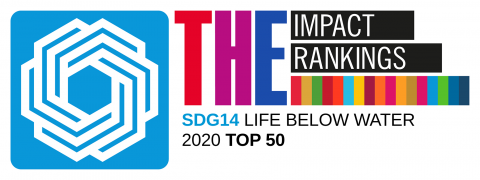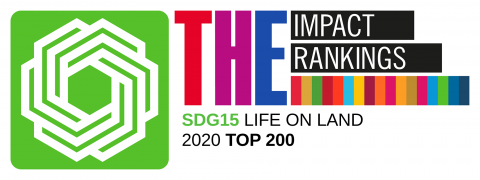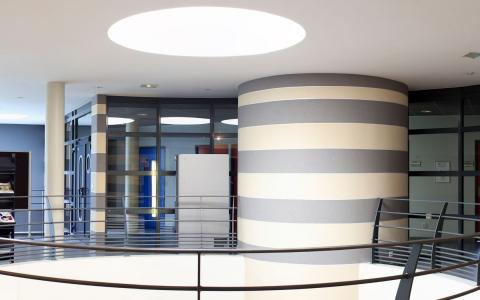
Presentation
The Environment and Risks Research and Teaching Center is one of the three research and teaching centers of IMT Mines Alès. It is specialized in the field of environment: water, air and risks. It provides a link between training, research and economic development activities in this field.
Missions and composition of the CREER
As such, its missions are threefold:
- To advance science and its applications, always in fields that meet the needs of business and society
- To train the school's students to the highest level, thanks to the high degree of expertise of its faculty;
- Promote the transfer of this expertise to businesses and society.
As illustrated in the image below, CREER is comprised of:
- 2 research teams
- 2 teaching departments and 2 specialized masters
- 4 technological platforms
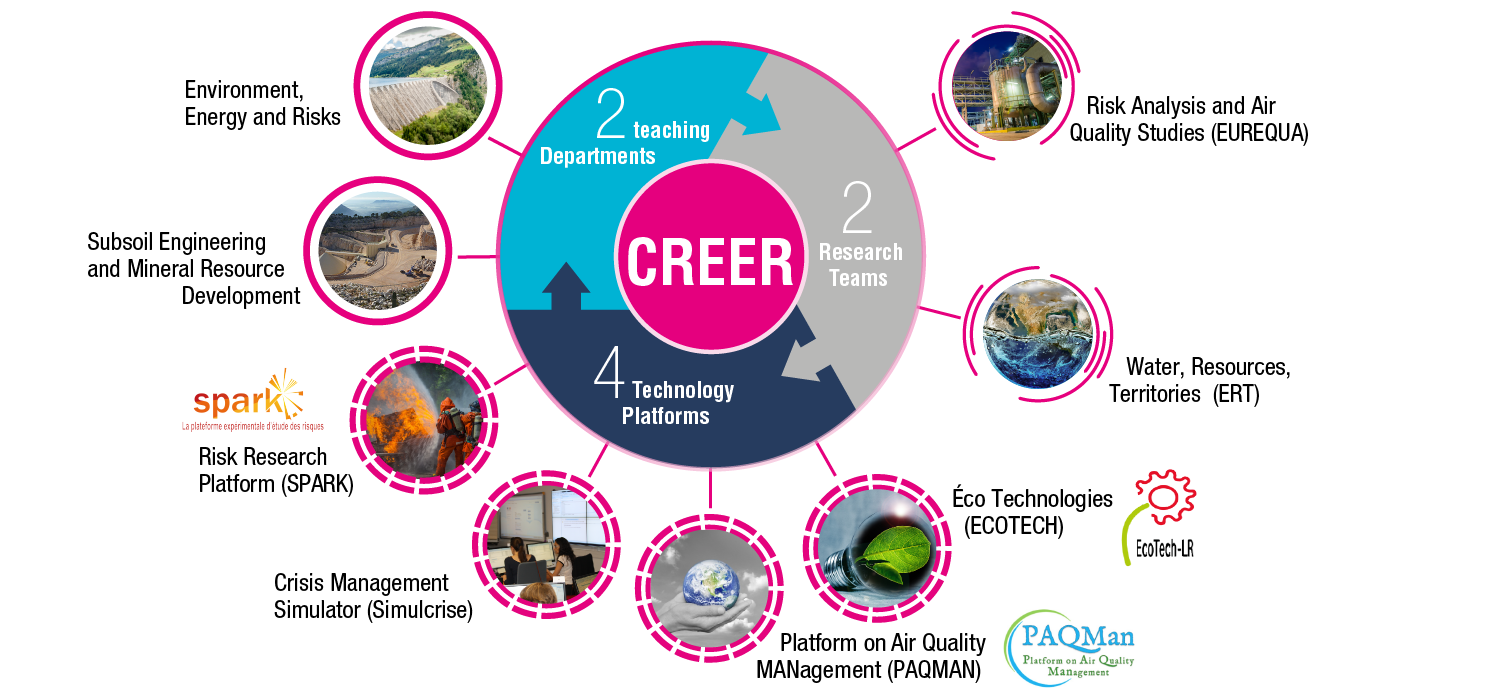
CREER's scientific and technological positioning at the service of society
CREER is an interdisciplinary center at the heart of sustainable development. It develops its scientific activities at the interface between the environment and human activity, by studying the means to reduce the negative environmental impacts and the risks related to these activities. It was created in 1974 to meet an industrial analytical demand in the field of water. Since 1997 it has been located on the Louis Leprince-Ringuet site of IMT Mines Alès, in three buildings of 3385 m2 (built in 1997), 1200 m2 (Institute of Risk Sciences, built in 2011) and another set of premises of 500 m2, including lecture rooms, offices, research laboratories and technical halls.
CREER's research activity is organized in two teams according to research targets: water (ERT team: Eau, Ressources, Territoires), risks and air quality (EUREQUA team: EtUde des RisquEs et de la QUalité de l'Air).
Research Teams
The ERT research team is interested in continental water as a fundamental factor of development of societies. The main theme of the team is water: resource or danger for human societies. Thanks to multidisciplinary approaches, it develops methodological approaches (measurement, modeling, management) to reduce the impact of human activities. It works on the problems of quantity and quality of water resources, contamination by pesticides, pollutants, coastal contamination and wastewater treatment. It conducts work on hydrology to assess the resources and behavior of water bodies (using artificial intelligence tools), including the problem of floods and hazards to populations. It uses environmental assessment and life cycle analysis methods and develops research on the circular economy and industrial and territorial ecology in order to reduce, or better understand and manage, environmental pressures on territories.
The EUREQUA research team studies risk situations, whether accidental or chronic, as well as the crises to which they may lead, with their consequences on environmental and societal equilibrium: impact on human populations, on the environment, on infrastructures and on lifestyles. The team seeks to understand the dynamics of transformation, the dangers they entail and the possibilities for controlling phenomena or vulnerabilities. The EUREQUA team's work is based on an integrated research model based on a global approach to problems, whether they be major risks or chronic risks (pollution, nuisances, etc.) caused by volatile organic compounds (VOCs), bio-aerosols and odor-related nuisances. For more than 20 years, the team has developed a common approach guided by scientific issues arising from the needs of socio-economic actors (industrialists, local authorities, government services...).
The scientific and technological skills developed through these cutting-edge activities are widely used in training activities. CREER runs two teaching departments: the Energy, Environment, Risks (E2R) department and the Subsoil Engineering and Mineral Resource Exploitation (ISERM) department, which allow students to benefit from a significant part of their training through research. This translates into the realization of R&D missions which are the realization of a research project by groups of students with the use of the technical means of the center. CREER is also responsible for the teaching of two specialized master's degrees accredited by the Conférence des Grandes Ecoles (CGE): the specialized master's degree in "Industrial Safety and the Environment" (SIE) and the specialized master's degree in "Mining Operations and the Environment" (2EM). Several dual degree courses are also offered.
The training of doctoral students is supported by two doctoral schools in which IMT Mines Alès is co-accredited to award the doctoral degree: the Biodiversity, Agriculture, Food, Environment, Land, Water (GAIA) doctoral school and the Risks and Society (R&S) doctoral school.
Support for the transfer of knowledge to industry takes the form of participation in calls for projects issued by the Occitanie region, the integration of regional companies in national or international calls for projects, direct contracts with industrialists, and assistance to start-up creators housed at the IMT Mines Alès incubator.
For all of its research, training and economic development activities, CREER relies on several platforms: a crisis simulation platform, a platform dedicated to air quality, a platform dedicated to the analysis of persistent organic pollutants (POPs) in various environmental matrices (water, sediment, sludge, etc.), and a platform on accidental phenomena related to industrial risks.
The teaching departments
Technology platforms
Contact
Anne Johannet
Coordinator of the CREER research and teaching center
